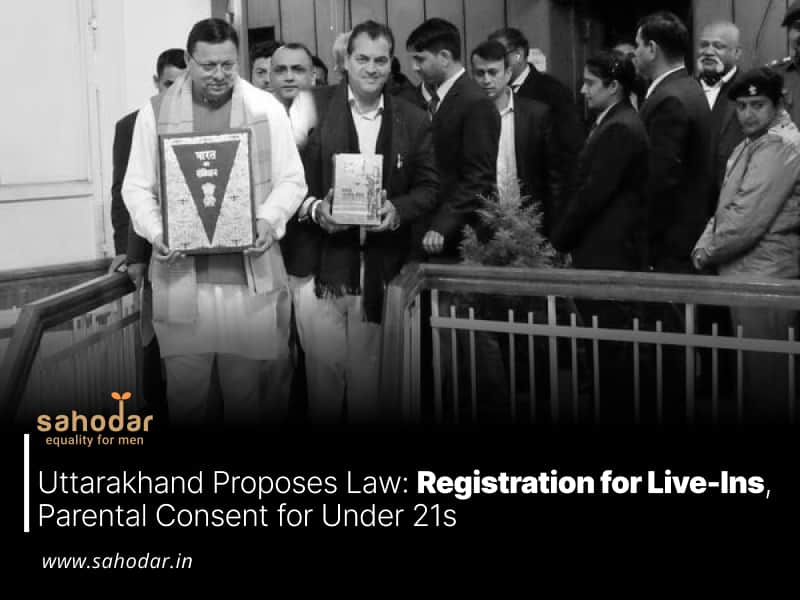The Uttarakhand Uniform Civil Code (UCC) Bill, presented in the Uttarakhand Assembly on Tuesday morning, stipulates legal acknowledgment for offspring born from cohabitational unions, alongside other provisions.
Uniform Civil Code Provision: The termination of formally registered live-in relationships necessitates the submission of a written declaration.
Dehradun Mandate: Upon the implementation of the Uniform Civil Code in Uttarakhand, individuals currently engaged in or intending to enter into live-in relationships are required to register with district authorities. Moreover, individuals under the age of 21 seeking to cohabit must obtain parental consent. This mandatory registration extends to individuals residing in Uttarakhand who are engaged in live-in relationships outside the jurisdiction of the state.
Live-in relationships will not be registered in cases that are “against public policy and morality”, if one partner is married or in another relationship, if one partner is a minor, and if consent of one partner was obtained by “coercion, fraud, or misrepresentation (with regard to identity)”.
A senior official told NDTV a website is being prepped to accept details of live-in relationship, which will be verified with the District Registrar, who will conduct a “summary inquiry” to establish the validity of the relationship. To do so, he may summon either or both partners, or anybody else.
In the event of refusal of registration, it is incumbent upon the Registrar to furnish a written communication delineating the rationale for such denial.
The “termination” of registered live-in relationships requires a written statement, in a “prescribed format” that can invite police investigation if the Registrar feels reasons for the relationship ending are “incorrect” or “suspicious”. Parents or guardians of those under 21 will also be informed.
Failure to submit declarations for live-in relationships or providing false information may result in imprisonment for three months, a fine of ₹25,000, or both. Those who neglect to register a live-in relationship could face a maximum of six months’ imprisonment, a fine of ₹25,000, or both. Even a slight delay in registration, such as by a month, could lead to imprisonment for up to three months, a fine of ₹10,000, or both.
Additional significant provisions outlined in the section pertaining to live-in relationships within the Uniform Civil Code, presented in the Uttarakhand Assembly on Tuesday morning, include the legal acknowledgment of children born from such relationships, thereby granting them the status of “legitimate child of the couple”.
According to the same official speaking to NDTV, this entails that the rights of all offspring born outside of marriage, whether from live-in arrangements or through surrogacy, will be uniform, ensuring that no child can be deemed “illegitimate”.
Furthermore, the official highlighted that under the Uniform Civil Code (UCC), all children will possess equal inheritance rights, encompassing parental assets. The UCC employs inclusive language, referring to “child” rather than distinguishing between “son” and “daughter”.
Additionally, as per the UCC draft, a woman abandoned by her live-in partner is entitled to claim maintenance. However, the draft does not explicitly define the term “desertion”.
Understanding Uttarakhand’s Uniform Civil Code
A Uniform Civil Code (UCC) pertains to a comprehensive legal framework applicable uniformly to all citizens, devoid of religious distinctions, governing various personal matters including marriage, divorce, inheritance, and adoption.
The adoption of a common civil code in Uttarakhand constituted a significant electoral commitment by the BJP during the preceding year’s assembly election, resulting in the party’s electoral success.
A committee established by the state, under the stewardship of a retired Supreme Court judge, has compiled a 749-page document based on an estimated 2.33 lakh written submissions and consultations with approximately 60,000 individuals.
Among its recommendations are measures proposing the absolute prohibition of polygamy and child marriage, the establishment of a uniform age of marriage for girls across all religious denominations, and the standardization of divorce proceedings.
Uttarakhand’s UCC initiative also aims to prohibit practices such as ‘halala’ and ‘iddat’, which constitute Islamic customs mandating specific obligations for women subsequent to divorce or the demise of their husband
Uttarakhand is not alone in advocating for a uniform civil code; Assam, also governed by the BJP, has announced intentions to enact analogous regulations later this year. However, in both instances, tribal communities—a pivotal constituency in each state—will be granted exemptions.

